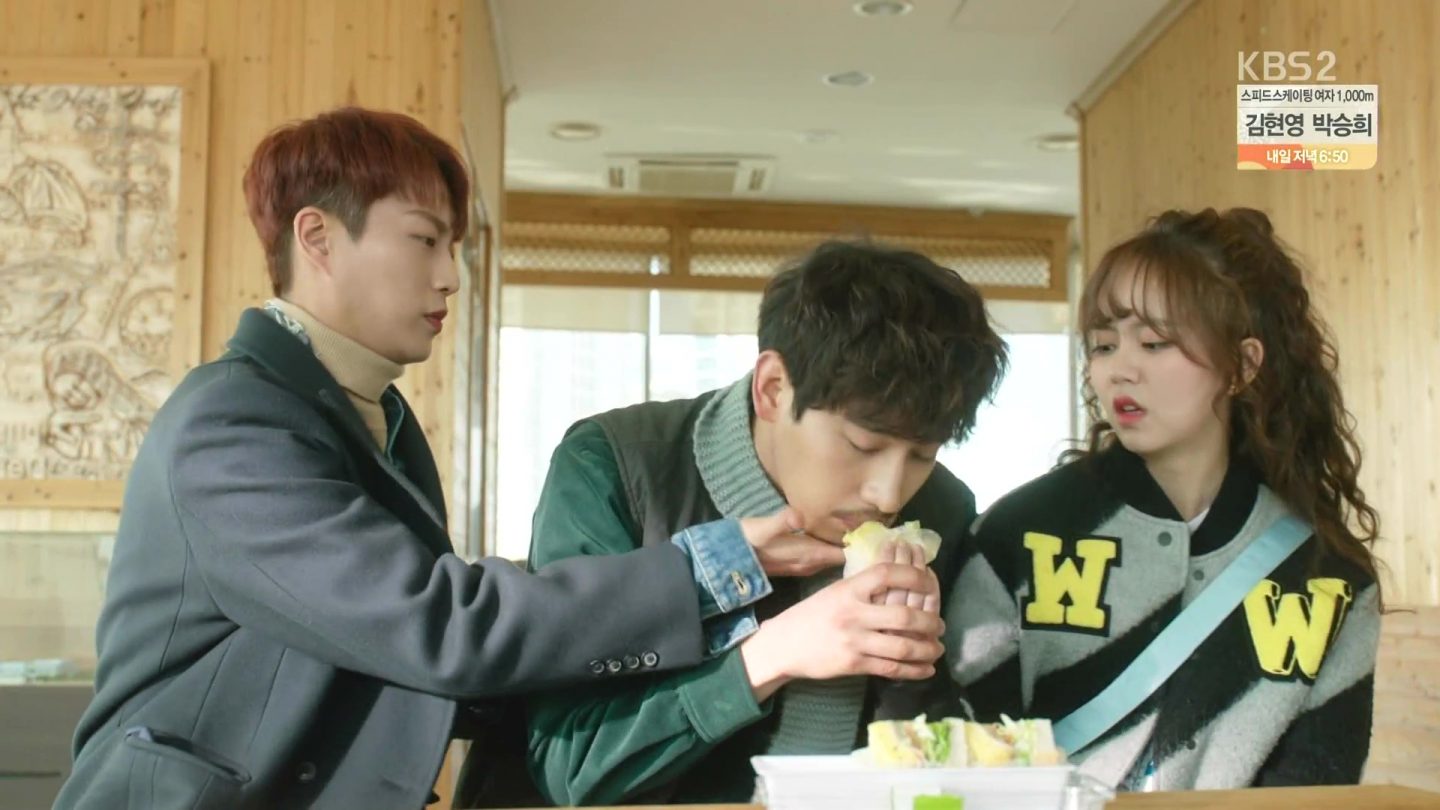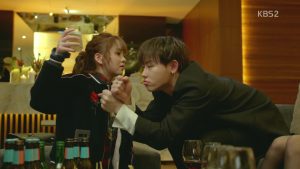 As someone who does volunteer work for a radio/TV station, I love watching any kind of show centered around the behind the scenes of public broadcasting. There’s just something so fulfilling about knowing that you’re a small part of something larger — that you’re actively contributing to the sounds that people hear when they turn on their car engine, or the images they see atop their fireplace mantel, even if it isn’t immediately obvious to the consumer. It’s a calm and quiet pleasure gained without the grueling task of having to entertain an audience, of which requires a particular skill set that not everyone possesses.
As someone who does volunteer work for a radio/TV station, I love watching any kind of show centered around the behind the scenes of public broadcasting. There’s just something so fulfilling about knowing that you’re a small part of something larger — that you’re actively contributing to the sounds that people hear when they turn on their car engine, or the images they see atop their fireplace mantel, even if it isn’t immediately obvious to the consumer. It’s a calm and quiet pleasure gained without the grueling task of having to entertain an audience, of which requires a particular skill set that not everyone possesses.
This is part of the reason why I love Radio Romance so much thus far, despite all its shortcomings. It encapsulates the excitement of working behind the scenes in radio quite well. Song Geu-rim (Kim So-hyun) constantly goes through a frenzied hustle to acquire and keep guests for her show and Ji Soo-ho, played by Yoon Doojoon of Highlight, slowly has a realization that radio’s ability to convey a message to those who may need it the most makes it a powerful tool; highlighting a side of the radio people may not be familiar with. The drama shows that working behind the sound booth can be pretty stressful, but it’s a good kind of stress that may just be worth it in the end. In that sense, the show is more than just a cliche love story, it is a love letter to radio itself — acknowledging it as a dying but prolific art form that deserves more attention than it currently gets.
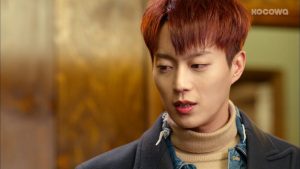
Whereas most dramas delegate a character’s occupation as secondary to romance, the radio in Radio Romance is more than this. It’s the force that brings all the characters together, the main character’s driving force, and the mechanism that causes the male lead’s character development. Most of its themes revolve around the power of radio to communicate and provide an open forum for the disenfranchised in a way TV and visual media cannot. Replacing the radio in this show is impossible; doing so would literally turn Radio Romance into a completely different show.
Another huge component of what makes the show enjoyable is its fun and colorful ensemble of characters. In fact, the cast seems to be Radio Romance‘s strongest point, structure-wise. Everyone in the series either serves a functional role, or appears as a subversion of typical k-drama character archetypes. Either way, they are all interesting to watch in their own ways, so no onscreen presence feels wasted.
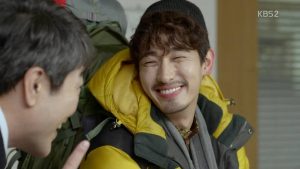
PD Lee Gang (Yoon Park) is my personal favorite character. In the beginning of the series, he was a fan favorite, though the tide seems to be shifting now. He’s definitely the most quirky second lead I’ve seen thus far, and his interactions with the other characters are enjoyable to watch. His new age spiritual shtick, signature pocket laser pointer, and skill for pissing off those around him while making them bend to his will results in an entertaining screen presence. Despite his horrible mentor-ship –a fact delineated by Song Geu-rim herself in the first episodes as she mentions that he only taught her for a couple weeks before he caused trouble and disappeared — his temper, his tendency to make life extremely difficult for his colleagues, and how overly informal and touchy-feely he is toward all the characters, he is the only one besides Geu-rim’s mother who truly believes in her abilities as a radio writer and actively shows his support for her. He gives vague reasons as to why he still calls Song Geu-rim “newbie” despite her position as main writer, but it appears as a term of endearment for him. He also treats the rest of the team with tough love, praising their work when needed but using threats and anger to goad them into doing what he wants.
Another way how PD Lee achieves his goals involves his skill at observing people and using their weaknesses to his advantage. He easily discerns from Soo-ho’s interactions with others that he is competitive to a fault, which allows him to trick Soo-ho into a drinking match and a garbage throwing bet, resulting in the nullification of the “no live shows” clause in their contract as well as another favorable outcome for him. He doesn’t seem to particularly care about making others uncomfortable or annoyed — just as long as it helps him achieve his goals.
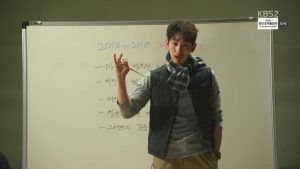
However, his promise to the listener who was wallowing in debt after a failed skincare line to promote their products, along with his aversion to using celebrity guests as a means of attracting an audience, and his aforementioned steadfast belief in Geu-rim’s abilities shows that he is actually quite idealistic contrary to his underhanded tactics. His contradicting pragmatic and idealistic traits make his onscreen actions unpredictable. This wildcard personality makes him a very engaging second lead, which is quite commendable, considering that the show has not afforded him a personal backstory so far.
We don’t yet know his motivations, the upbringing that may have caused him to resort to underhanded tactics, the true reason behind his anger issues, or his psychological reason for acting the way he does, so it is difficult to hand him the same sympathy given to Soo-ho, and much easier to dismiss him as an unstable jerk — to put it plainly. Many seemed to take issue with how he accidentally shoved Geu-rim to the ground during an altercation with Soo-ho, and the whole live show fiasco. Though the former action is indisputably unsavory, to say the least, his manipulation of Soo-ho was definitely for his and Geu-rim’s own good; if things had continued the way they were, Soo-ho would have continued to reject Geu-rim’s scripts, hindering her potential growth as a writer, as well as his own as a DJ.
Moreover, the whole ordeal was PD Lee’s way of pointing out the flaw in Soo-ho’s logic that his contract was a result of inherent trust between two parties: it was very much manipulated by a one-sided power imbalance, in which Soo-ho held the upper hand. By tricking him into getting drunk and signing the contract, PD Lee shows Soo-ho that a contract like that is very tentative — just how he easily maneuvered Geu-rim into signing the contract, Soo-ho could just be as easily influenced into adding a clause into the contract when the tables of power turn. The whole debacle seemed to be intended by PD Lee to ram in a particular point to Soo-ho: the contract was never based on trust, because Soo-ho never trusted any of them in the first place. Though the ethics of the situation is debatable, the fact remains that it was perhaps the most effective way to make Soo-ho realize that he isn’t invincible, and that his trust issues are the source of his vulnerabilities.
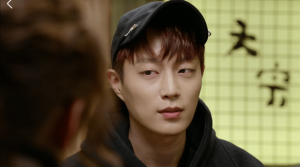 Within a K-drama love triangle, one can ordinarily distinguish the second lead from the main lead by determining who the conventional “nice guy” is out of the pair of men. Not in this case. PD Lee has just as many problems as the main lead, which allows him to serve a functional role as Soo-ho’s fictional mirror. Soo-ho and PD Lee share a lot of similarities with each other, which is why they frequently clash over issues regarding the radio program, and Geu-rim.
Within a K-drama love triangle, one can ordinarily distinguish the second lead from the main lead by determining who the conventional “nice guy” is out of the pair of men. Not in this case. PD Lee has just as many problems as the main lead, which allows him to serve a functional role as Soo-ho’s fictional mirror. Soo-ho and PD Lee share a lot of similarities with each other, which is why they frequently clash over issues regarding the radio program, and Geu-rim.
In particular, they both do whatever they want to her whenever they feel like it, and they both treat her more like an errand girl than a main writer — as lamented by PD Lee himself. And they are both innately competitive individuals — shown by the street race that they engage in. They are also both used to getting whatever they want, though PD Lee seems to be better at actually achieving his goals due to the experience he has dealing with difficult DJs. Soo-ho doesn’t have nearly as much life experience and street smarts due to his suffocating celebrity family. Now, certainly, rich and famous characters with cold, distant families are an old trope in the k-dramaverse.
However, Soo-ho’s appeal comes from his actor’s excellent performance and the show’s attempt to deconstruct the trope. The lifelessness and flatness of his eyes are aptly portrayed by Yoon Doojoon. His dead stare as he switches his bedroom lights on and off is something Doojoon depicts especially well. Also, the show makes a marked effort to show the mental toll that his distance and falsified relationship with his family has caused him, demonstrating a deconstruction of the standard aloof male lead archetype.
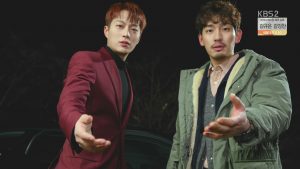
The relationship that he has with his family members are reflected onto his relationships with others he meets, meaning that he has no true friends or people that he really trusts and has to constantly put on an indifferent personality in front of others. In particular, he is very standoffish to Geu-rim as he lies to her multiple times about how he feels, which is likely due to a combination of his lifelong isolation and a hinted-at incident in the past that caused him to resent her. This could be the reason why he becomes an actor — he is so used to pretending and fronting in front of strangers and friends, that doing it in front of a camera is no skin off his back. Using trope names, I would describe him as a tsundere and a stepford smiler.
In the first four episodes, PD Lee — despite his flaws — is portrayed as the more sympathetic contender for Geu-rim. After all, it is Soo-ho who makes life extremely difficult for Geu-rim for refusing to DJ her show at first, and it is him who rejects her script without notifying her in advance. PD Lee is the person who believes in her capabilities to improve as a writer, encourages her to maintain her tenacity despite Soo-ho turning down her offer, and makes an active attempt to comfort her after Soo-ho discards the script she worked hard on.
However, Soo-ho becomes more sympathetic over the course of episodes 5 and 6, as he begins to realize just how vulnerable he actually is after he finds out how easily PD Lee manipulated him into adding the live show clause into the contract, resulting in his on-air flub. He also becomes more humbled and empathetic through his interactions with people whose lifeline is essentially the radio (Geu-rim’s mother, the man with the failed skincare line, the elementary school kid who reminds him of himself, and the old man who mistakens him for his son), gaining more respect for the radio and consequently, Geu-rim herself. All these events surreptitiously changes him to the point where he makes the bold move of kissing Geu-rim.
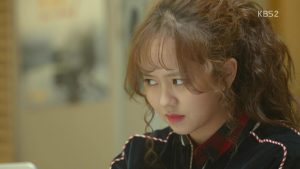
Speaking of Geu-rim, there isn’t anything too terribly remarkable about her at first glance. She’s a standard plucky girl lead with less than fortunate circumstances and a sense of passion and determination that slowly thaws away the frost of the haughty male lead.
However, what makes her such a compelling protagonist is that she has a more mature edge to her than most romance drama female leads. A slight touch from Soo-ho or PD Lee doesn’t seem to faze her; she acknowledges Soo-ho’s attempts to keep her from falling over in the transportation cart and his car with a curt thank you — no overly exaggerated heartbeats, stammering, blushing, or a dreamy stare. In fact, if it weren’t for the presence of the slow-mo freeze frame effect so often used by K-dramas to signify an innocuous event as a life-altering romantic stride, I probably wouldn’t have perceived the scenes as romantic.
Also, she is clearly defined by her own goals, passion, and drive outside of the male leads. Her love of the radio, the new paradigm about turning failures into success that she adapts to keep her head up after being treated like dirt by her colleagues, and the improvement in her writing over the six episodes span are acquired from a life with her blind mother, and advice/ criticism from her mentors — not Soo-ho. In fact, judging from the episode previews for 7 and 8, Geu-rim doesn’t even remember Soo-ho from her past. Perhaps this shows how insignificant he was to her because of how used to she is to such interactions. I’m hoping the drama doesn’t go the makjang route and reveal it as the result by a massive amnesia episode stemming from a broken heart, but there is a strong indication that it might.

One thing that perhaps contributes to the charm of the main trio is how much information is communicated through the male leads’ eyes. We gain more information from Yoon Doo-joon’s stolen, gentle glances at Song Geu-rim than we do in what he says to her. Similarly, it is the crestfallen look on PD Lee’s face as Geu-rim focuses on Soo-ho’s whereabouts and ignores his attempts to communicate how worried he was solidified him as the second lead rather than the conversations they share as boss and subordinate. Part of the reason for this is the chemistry between the actors. Every scene that Soo-ho and Geu-rim are together alone, the attraction and tension between them are nearly palpable. And I’m sure I’m not alone when I say that the kiss scene at the end of episode 6 warrants no complaints, chemistry-wise. The amazing chemistry between the two actors is a pretty impressive feat, considering their age gap. I was half expecting a My Lovely Girl kind of strained kiss due to the ten year difference between the actors, and luckily, that didn’t happen.
Another interesting character is Soo-ho’s self appointed personal psychologist, Jason (Kwak Dong-yeun). In the beginning of the show, he seemed only to serve a functional purpose: doling out information on Soo-ho’s depression, his relationship with his family, and his difficulty opening up to people in a more entertaining and high-octane fashion than a dull voiceover from Soo-ho. However, episode 6 implies that there is much more behind his tirelessly animated veneer — pairing a scene where he talks to someone off-camera as macabre slasher music plays in the backdrop. This raises some questions: what are his true motives for treating Soo-ho? Is he really one of the good guys?
Even the rivalry between La La-hee (Kim Hye-eun), Lee Seung-soo (Im Ji-kyu), Geu-rim and PD Lee is interesting to watch. Though Ms. La and Mr. Lee are standard K-drama scornful rivals intended to make the audience root more strongly for the leads, their amusing onscreen banter and semi-antagonistic relationship makes them fun to watch. However, the real antagonist appears to be Soo-ho’s mother (Nam Joo-ha, played by Oh Hyun-kyung), who uses Ms. La as a pawn to get Soo-ho to quit his show. Jin Tae-ri (Yura from Girls’ Day) is another contender for the title of true villain — albeit a more sympathetic one — as she appears to have knowledge about Soo-ho’s dark past, and seems willing to use it for leverage if needed.

The last thing I have to note about Radio Romance is the selection of music. As expected of a show centered around a crucial component of the music industry, the OST is nice. Whereas most light romance dramas usually have light acoustic or ballad numbers interspersed between scenes, Radio Romance alternates between a synth electronic instrumental pleasant to the ears and an upbeat poppy track by Taeil and Doyoung of NCT_U to complement the lighter scenes, along with more standard ballads by Bernard Park and Migyo in the heavier and more introspective scenes. The former two songs are catchy numbers that I always enjoy listening to in every episode, and the latter two appropriately augment the drama’s more serious moods.
Within the first four episodes of a K-drama, there is usually enough information given to gauge how to watch the show — whether it is best viewed by shutting off one’s more critical side to best enjoy a ride of cuteness and light scenarios, or to actively engage in the plot as to not miss its intricacies and layers of heavy themes. Radio Romance is definitely the first type of show. Despite all its perks, the first word that I associate with the drama is the word “cliche”. Though commendable in how it deconstructs genre tropes when it comes to the characters and its personal appeal through themes centered around the radio, it still relies on overused standard tropes to propel itself forward.
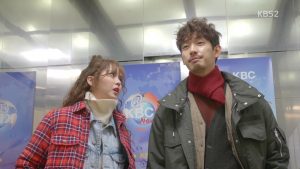
However, it is precisely because of the fact that we are still only six episodes into the series that the kind of cliche that characterizes the series so far can exist without detracting too much from the drama’s entertainment value. Nonetheless, with a precedent set by the interesting characters, one inevitably develops expectations that the plot will do the same kind of subversion seen of the drama archetypes.
These standard plot tropes, if played completely straight as the series nears its end, will get tiring quickly. Even the characters can’t last too long existing as simple subversions of standard tropes; they must slowly develop their own complications, messiness, and distinct identities outside of established fictional devices in order to feel realistic (but fortunately, Radio Romance does seem to be headed in this direction). In order to grow into a drama that one can confidently describe as good, the show will have to learn how to wean itself off of cliches and stand on its own two feet as it continues to progress.
(Images via KBS)
